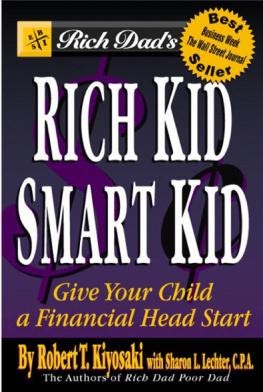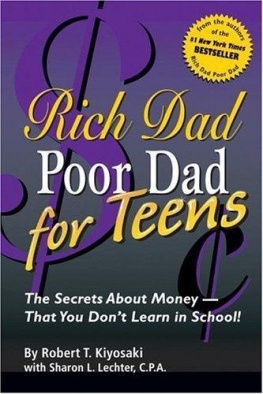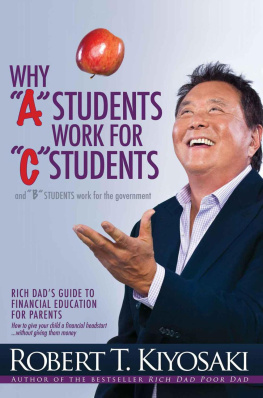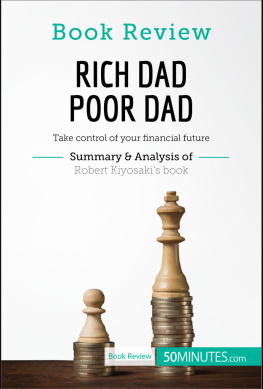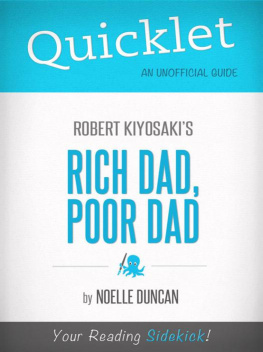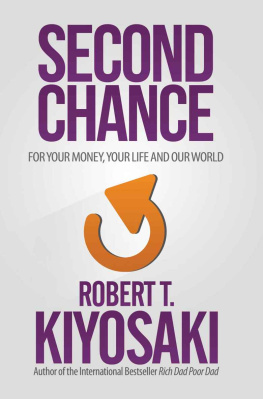A Message from Robert
This book is dedicated to those who step up
and become part of the solution.
A Message from Robert Its Not Cool
I thought long and hard about sharing with you our financial success, especially during times like these. I know that millions of people have lost their jobs, their homes, and their businesses. I also know that, in most situations, it is not polite to talk about financial success. Bragging is never cool, especially about money.
Yet, I decided to write about real-life investments. I want you to understand how we gained our financial education, how we use that education, and why it is an unfair advantage, especially in a declining economy. I write not to brag. I write to encourage people to learn, study, practice, and possibly see the world differently. In 2011, there is a lot of money in the world. There are trillions of dollars looking for a home because governments of the world are printing trillions in counterfeit money, aka fiat currency. Governments do not want the world to go into a depression, so they print more funny money. This is why the price of gold and silver go up and why savers are losers.
The problem is that this phony money is in the hands of only a few people. So, the rich get richer, the poor and middle class grow poorer, the economy worsens, and the problem grows bigger.
According to the U.S. Census Bureau, poverty in America increased to nearly 15 percent of the population in September 2010. This means over 4 million people moved from the middle class into poverty, just as Donald Trump and I predicted in our book Why We Want You To Be Rich. This is dangerous. This is not healthy.
At the risk of sounding like a braggart, I decided to write this book about real-life investments. I believe it is uncool to know something and not share what I know. That would be greedy. I write because I believe we need real financial education before the world economy can truly recover. Ultimately, I write because I believe it is better to teach people to fish than to give people fish.

Robert Kiyosaki
My rich dad said,
Choose your teachers wisely.
Introduction - HOW DO YOU CATCH A MONKEY?
Natives of Africa and Asia have used this technique to catch monkeys for thousands of years: The hunter finds a tree with a small hole in the tree trunk and places fruits or nuts inside the hole. A monkey comes along, puts their fist in the hole and grabs onto the fruit or the nuts. The monkeys fist, now clenched and filled with the fruit or nuts, cannot be withdrawn from the hole, trapping the monkey. Rather than let go of the fruits or nuts, the monkey twists and turns, pulls and tugs, but refuses to let go. The native returns, and at their leisure, kills or captures the monkey.
Humans are similar to monkeys. Rather than cling to fruits or nuts, humans cling to job security, their possessions, and money. Due to a lack of financial education, like the trapped monkey, most people will spend their lives as wage slaves of their employers and tax slaves of the government.
When the global financial crisis began in 2007, many people clung even more tightly to their jobs in the hope of not being one of those who were laid off. Millions held on tightly to their homes, even though they could not pay the mortgage. Most cut back on their spending and saved more, even though the federal government was printing trillions of dollars, destroying the purchasing power of their savings. Workers stuffed even more money into their retirement plans, even though the stock market had crashed, wiping out their prior gains. And school enrollments boomed, as more people headed back to school, even though unemployment was soaring.
Most People Do Not Know What to Do
By 2010, most people knew there was a global financial crisis. Unfortunately, most people do not know what to do about it. Rather than let go, most people clench their fists tighter and wait for the crisis to pass, praying that their political leaders can solve this global crisis and that happy days will return.
A few know they must make changes. Yet without a strong financial education, they do not know what to do or how to change.
A Decade of Crisis
The problem is that the coming decade, the years from 2010 to 2020, will prove to be the most volatile world-changing decade in world history.
Unfortunately, the people clinging to the relics of the pastrelics such as job security, savings, a home, and a retirement plan will be those who are most ravaged by the global financial storm approaching. I can make this statement with certainty for the following five reasons:
1. It is the end of the Industrial Age.
The Industrial Age began around 1500 and ended around 2000.
In 1945, at the end of World War II, the United States was the worlds most powerful nation, the biggest of the few remaining empires of the Industrial Age.
During the Industrial Age, countries with industrial technology, factories, great schools, and weapons ruled the world.
During the Industrial Age, the auto industry, airline industry, radio and television industry, and the weapons industry dominated the world of business.
During the Industrial Age, a worker could find a high-paying job for life, be protected by a labor union, and receive a retirement paycheck for life.
Financial education was not important in the Industrial Age.
In 1989 the World Wide Web was born. The Industrial Age ended and the Information Age began.
In the coming decade, more jobs will be replaced by technology as our factories are dismantled, shipped, and rebuilt in low-wage countries. The idea of a high-paying job for life and a retirement paycheck for life is an obsolete idea.
Today, the United States is the biggest debtor nation in world history. The United States cannot afford social programs such as Social Security and Medicare.
In the Information Age, the age where job security and a pension for life are not guaranteed, financial education is essential.
Unfortunately, like a monkey with its fist caught in a tree, millions of workers cling to Industrial-Age ideas such as going to school, job security, steady paychecks, medical benefits, early retirement, and government support for life.
In this book, you will find out what kind of education is best for preparing you for the Information Age.
2. The rules of money were changed in 1971.
In 1971, President Nixon took the U.S. dollar off the gold standard, and the rules of money changed.
In 1971, the U.S. dollar stopped being money and became an instrument of debt. After 1971, savers became losers.
Since 1971, the U.S. dollar has lost 95 percent of its purchasing power. It will not take another forty years to lose the remaining 5 percent.
Tragically, like a monkey with a clenched fist in a tree, millions of people still cling tightly to their savings in a bank.
In this book you will find out why saving money is foolish and what you can do instead.
Since the banks can print money, why cant you? You will find out how you can in this bookbut it takes financial education.
3. After 1971, bank bailouts increased in size.
By 2010, most people were aware of the subprime mess and the trillions in bank bailouts all over the world.
Today, many are angry that the governments bailed out the rich bank owners and passed the bill on to the taxpayers.
Unfortunately, few people are aware that these bailouts have been going on for years and have increased in size since 1971. In the 1980s, the bank bailouts were only in the millions. By the 1990s, the bank bailouts were in the billions. After 2007, the bailouts became international and are now measured in the trillions.
Next page

